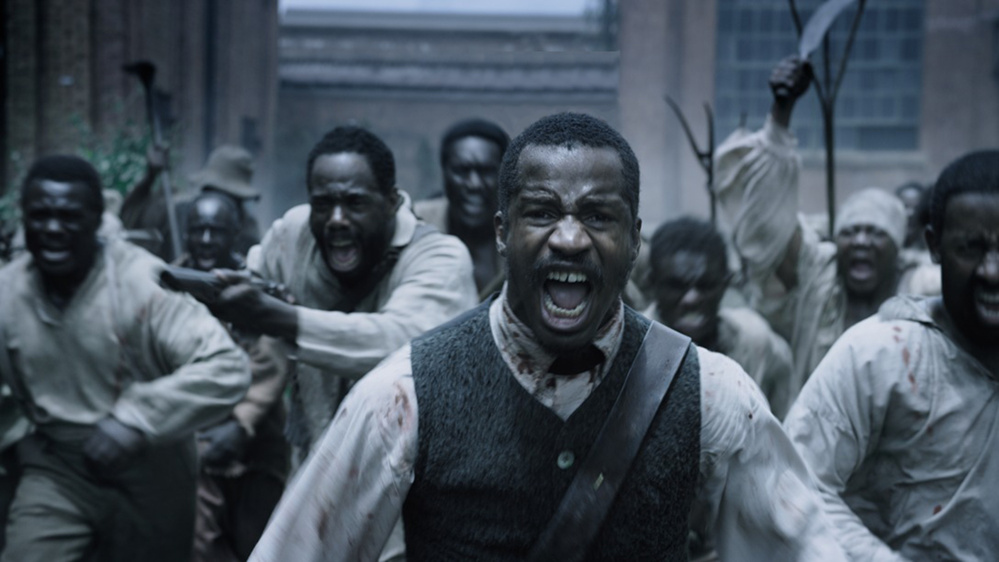A black filmmaker puts his acting career on hold, raises nearly $10 million and makes a movie about the rebel slave Nat Turner. His film receives a rapturous reception at a major festival, a bouquet of awards and praise from Hollywood’s elite.
A white novelist writes a best-selling account of Nat Turner’s life. Critics call it a major accomplishment, and the book wins the country’s top literary prize. But black intellectuals denounce it as racist. Hollywood scuttles a plan for a movie, and the writer, wounded by the accusations, retreats.
Fifty years separate the experiences of Nate Parker, the filmmaker, and William Styron, the novelist. Yet the controversy over who has the moral authority to speak about the experience of slavery in this country seems ready to start up again.
During interviews at the Sundance Film Festival in Utah, Parker took a moment to distinguish his film, “The Birth of a Nation,” from Styron’s book, “The Confessions of Nat Turner.”
He called the novel “a defamation,” as if borrowing a page from the debate that dominated critical circles in this country half a century ago.
“By the time Styron’s ink dried,” he said, Turner was “an impotent and cowardly self-hating Uncle Tom whose ambitions regarding rebellion had little to do with the rampant torture and degradation of his enslaved people, but instead was steeped in his desperate sexual desires for white women.”
Parkers’s vision of Turner is distinctly different. He describes the rebel slave as “a measured, self-determined man of faith, whose courage and sacrifice left him a martyr.” He calls his movie “the black ‘Braveheart.'”
No one can really know who Nat Turner was, but these divergent portraits are reminders of the role slavery continues to play in shaping race relations in this country, leaving black and white Americans struggling to find a common language for this largely unspoken tragedy.
The film’s reception at Sundance – “instant rapture,” by one account – has been explained in part as a reaction to the allegations of exclusion and discrimination that have fueled the #OscarsSoWhite controversy. Yet the Nat Turner story has never failed to inspire a passionate response.
SUSPECT ACCOUNT
What little is known about Nat Turner – the preacher and slave who in 1831 led a bloody two-day revolt in southern Virginia – is suspect. Accounts from the time estimate about 60 whites were killed in the insurrection, and in the weeks that followed, many more blacks were killed in retribution.
Turner’s confession was published by Thomas Gray, a white attorney who interviewed him not long after his capture and just days before his hanging. It is hardly a credible document, believed to have been written mostly to calm white fears that a greater insurrection might be at hand.
The mystery of Nat Turner has done little to dislodge him from the popular imagination. A reference point for rappers, inspiration for novelists, he provided an opportunity for Parker to present an “honest confrontation” with slavery, “an injury that we’re still tethered to.”
On the interview circuit, Parker, 36, speaks eloquently about “the shortage of heroism” in the history he was taught as a child growing up in Virginia. Not until college did he learn about Turner, and he was dismayed to find out the revolt occurred less than 100 miles from his home.
Determined to tell this story, he put his acting career on hold two years ago and began to line up investors.
Styron, who died in 2006 at age 81, came to the story with the same idealism. He too grew up in Virginia, near the site of the revolt, and wanted “to portray an era of history which we are now beginning to understand to our enormous heartbreak and misery.”
He started writing in 1962, turning Turner’s confession to Gray – one of the most haunted slave narratives, half a zealot’s accounting of faith and half a terrible reckoning of the revolt – into “a meditation on history.”
Turner, according to Gray, was a man in the thrall of his beliefs, which bordered on apocalyptic millennialism. Given to fasting and prayer, he had visions, one of which he recounted to his attorney:
“… White spirits and black spirits engaged in battle, and the sun was darkened – the thunder rolled in the Heavens, and blood flowed in streams …”
When a solar eclipse passed over Virginia on Feb. 12, 1831, Turner considered it a sign to rise up.
When Gray asked him in jail, “Do you not find yourself mistaken now?” Turner replied: “Was not Christ crucified?”
To have written a historical novel, Styron argued, would have limited him to the facts of the confession, and Turner would have emerged as a “ruthless and perhaps psychotic fanatic.”
The novelist instead wanted to represent “what the human spirit could achieve in overcoming the most ruinous and despotic form of human bondage that men have ever imposed on other men.”
He told Turner’s story in the first person, assuming the voice and presuming to understand the life and psyche of a slave. His Turner is literate and devout but ineffectual. During the revolt, he seems incapable of violence.
“Kill him!” one rebel shouts as they storm the home of their first victim.
“But I was not ready,” Turner thinks to himself.
His sole victim comes later: a young white woman whom he desires but knows he can never have.
Published in 1967, “The Confessions” won a Pulitzer Prize and the film rights were acquired for more than $600,000 by 20th Century Fox. When awarded an honorary degree at the historically black Wilberforce University in Ohio, Styron was greeted with thanks and praise.
But black intellectuals hammered Styron’s account as a lie, arguing that “only the truth about black people, and the endless system of degradation and oppression to which they have been subjected … will set us all free from our racial nightmare,” as the chairman of the newly formed Black Anti-Defamation Association wrote in a 1968 letter to The Times.
Later that summer, Beacon Press issued “William Styron’s Nat Turner: Ten Black Writers Respond,” a collection of essays that assailed popular reception of the novel. Its writers were angry and forthright.
“Why has the book received so much applause from the established press and a large number of well known ‘scholars’?” asked its editor. “Have they failed to see Nat Turner as a hero and a revolutionist out of fear that they might have to see H. Rap Brown and Stokely Carmichael the same way?”
Even as the New York Review of Books published a defense – an analysis of the attacks and an assessment of the Black Power movement – Styron began to retreat.
The movie – to be produced by David Wolper and directed by Norman Jewison and starring James Earl Jones – stalled. Styron stopped getting calls. “In typical Hollywood fashion,” he told The Times in 1982, “they knuckled under pressures, and they were preparing a bastardized version with the help of two black historians.”
When the filmmakers went to scout locations in Virginia, they were met with dissent from blacks and whites, who didn’t like Styron’s portrayal of them either. The project was abandoned. Styron, unrepentant, admitted to being “lacerated and hurt.” Ten years later, he came out with “Sophie’s Choice.”
CHANGING TIMES
“The Confessions” had born the brunt of a cultural shift in America. As Styron later wrote, “the dream of amity, concord and the hope of mutual understanding” from the civil rights movement had turned to the politics of confrontation.
The death of Medgar Evers, Bloody Sunday, Birmingham, bombings and churches set on fire demanded nothing less, and a country that had little experience talking about race – and in particular, slavery – struggled to find the right words.
“The old images no longer work,” said actor and social activist Ossie Davis during a discussion in Beverly Hills on May 28, 1968. In a cabaret on Roxbury Drive, Davis shared the stage with Styron and their mutual friend, the black novelist, essayist, poet and playwright James Baldwin.
“The old language no longer holds water,” Davis said. “What is really happening … is that the black community is speaking in a new language to which it hopes the white community will respond in a new fashion.”
Time would eventually make these conversations easier, especially as popular culture began to wear down the sharp edges. When Alex Haley’s portrait of slavery, “Roots,” was turned into a miniseries in 1977, an estimated 130 million Americans tuned in.
Fans of Styron’s “Confessions” also began to speak up. Historian Henry Louis Gates Jr., an African American, called the novel “brilliant” and disputed the premise that a white man lacks “the authority, the authenticity, the moral claim to write responsibly about an event in African American history.”
“Censorship is to art as lynching is to justice, and it’s just as disgusting when blacks do it as whites,” Gates told the New Yorker in 1999.
African American culture, it has been argued, has formed around resistance to racism in America, and Parker seems ready to follow in this tradition.
“Resistance lives in the air in this current moment,” he said. “Anyone who sees this film should leave the theater and feel compelled to be a change factor with respect to relations that are taking place in this country.”
Columbia University historian Eric Foner, an authority on slavery and 19th century America, argues that Turner occupies a different place in the nation’s consciousness than such rebels as Crazy Horse because the conversation about slavery has been either one-sided or muted, saddled with either guilt or recrimination.
Foner points out that there is only one museum to slavery in this country, in Wallace, La., and that public memorials to Turner are mostly limited to road signs in Southampton County, Va., site of the revolt he led.
“Slavery was not a footnote in the history of American freedom,” Foner says. “It is an essential part of American history, and until we grapple with what that means to our society, watching a movie about slavery or electing a black president is not going to solve that problem.”
In discussing Styron’s book, Davis chided the black community for not writing Turner’s story itself. He called for another portrait, of a majestic, forceful and intelligent leader.
“I need from Nat Turner and the facts of his history to make that thing which glorifies blackness in a society which is horrified by blackness,” said Davis.
Whether Parker’s portrait of Turner will answer this call remains to be seen. The need for a hero is different than the need for a historical reckoning and an understanding of what fostered this brutal revolt.
The movie is due out later this year.
Send questions/comments to the editors.




Success. Please wait for the page to reload. If the page does not reload within 5 seconds, please refresh the page.
Enter your email and password to access comments.
Hi, to comment on stories you must . This profile is in addition to your subscription and website login.
Already have a commenting profile? .
Invalid username/password.
Please check your email to confirm and complete your registration.
Only subscribers are eligible to post comments. Please subscribe or login first for digital access. Here’s why.
Use the form below to reset your password. When you've submitted your account email, we will send an email with a reset code.